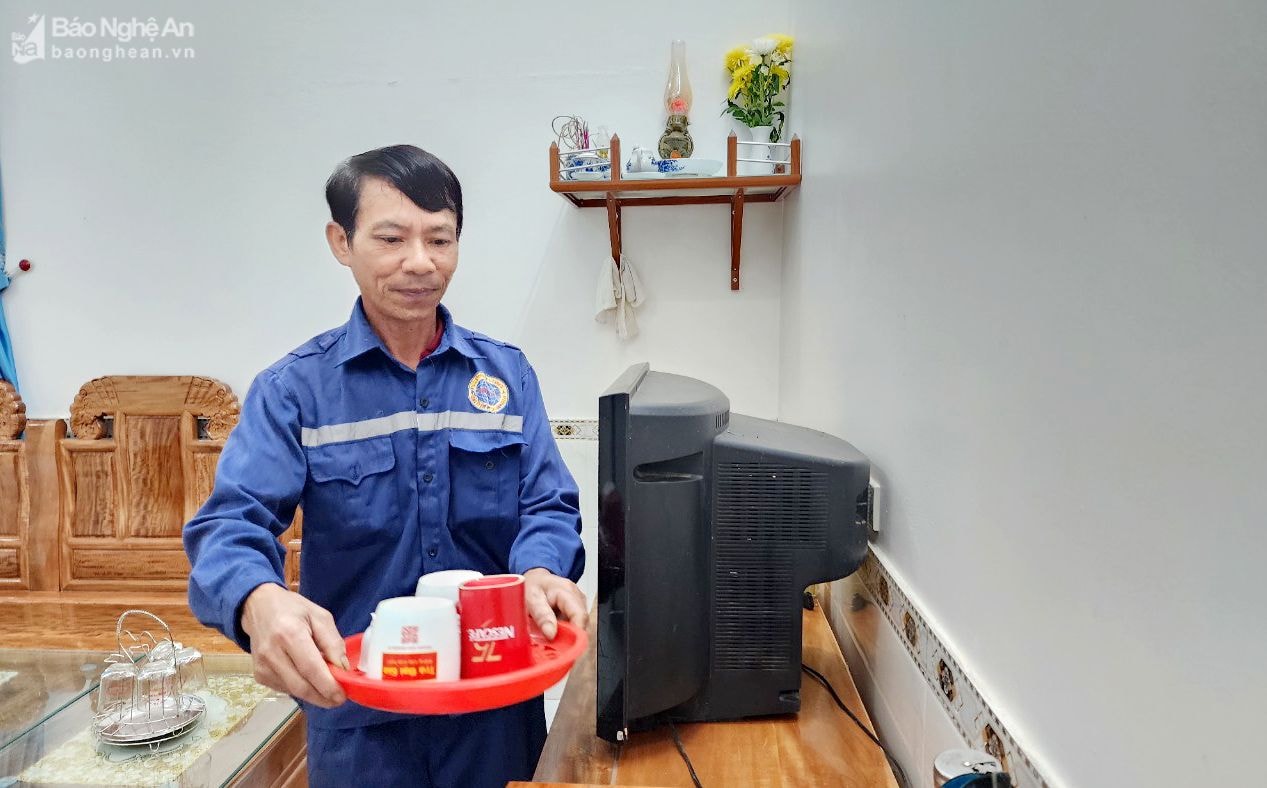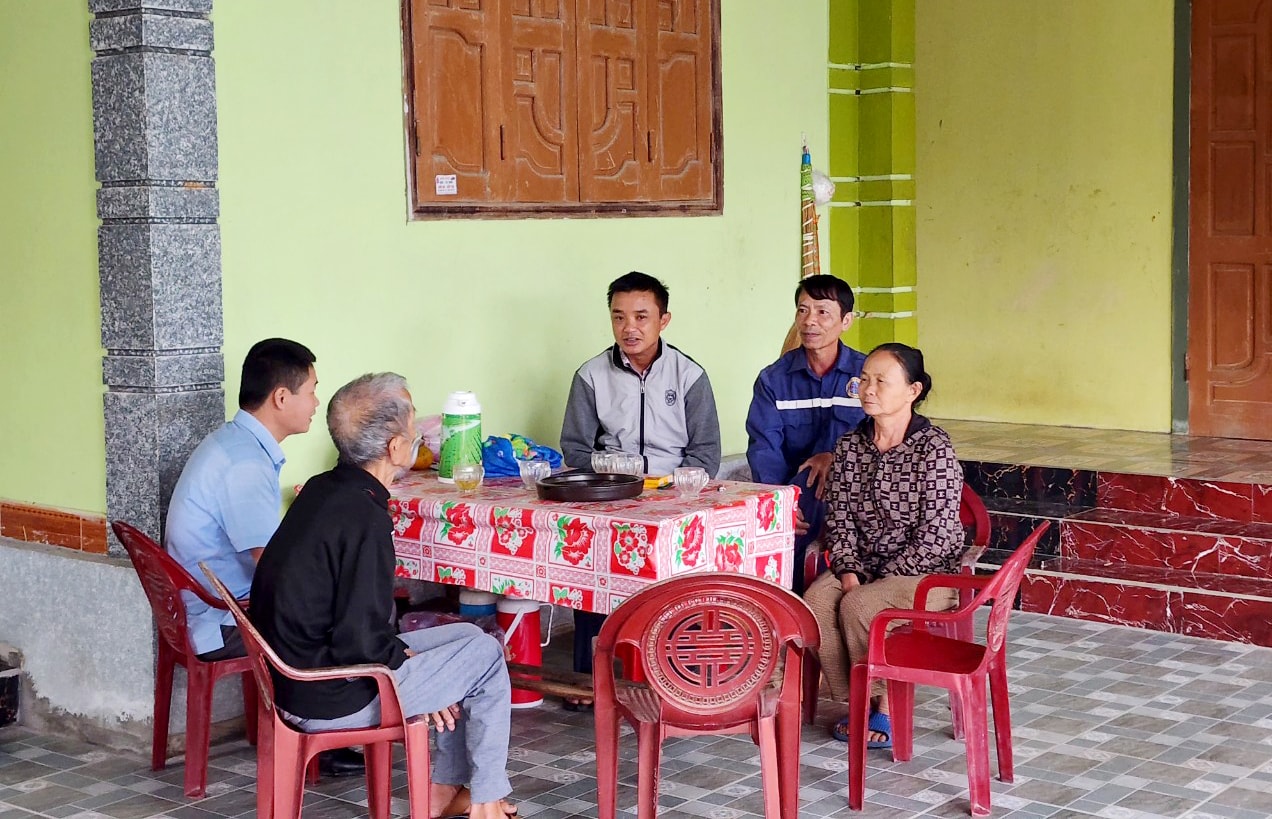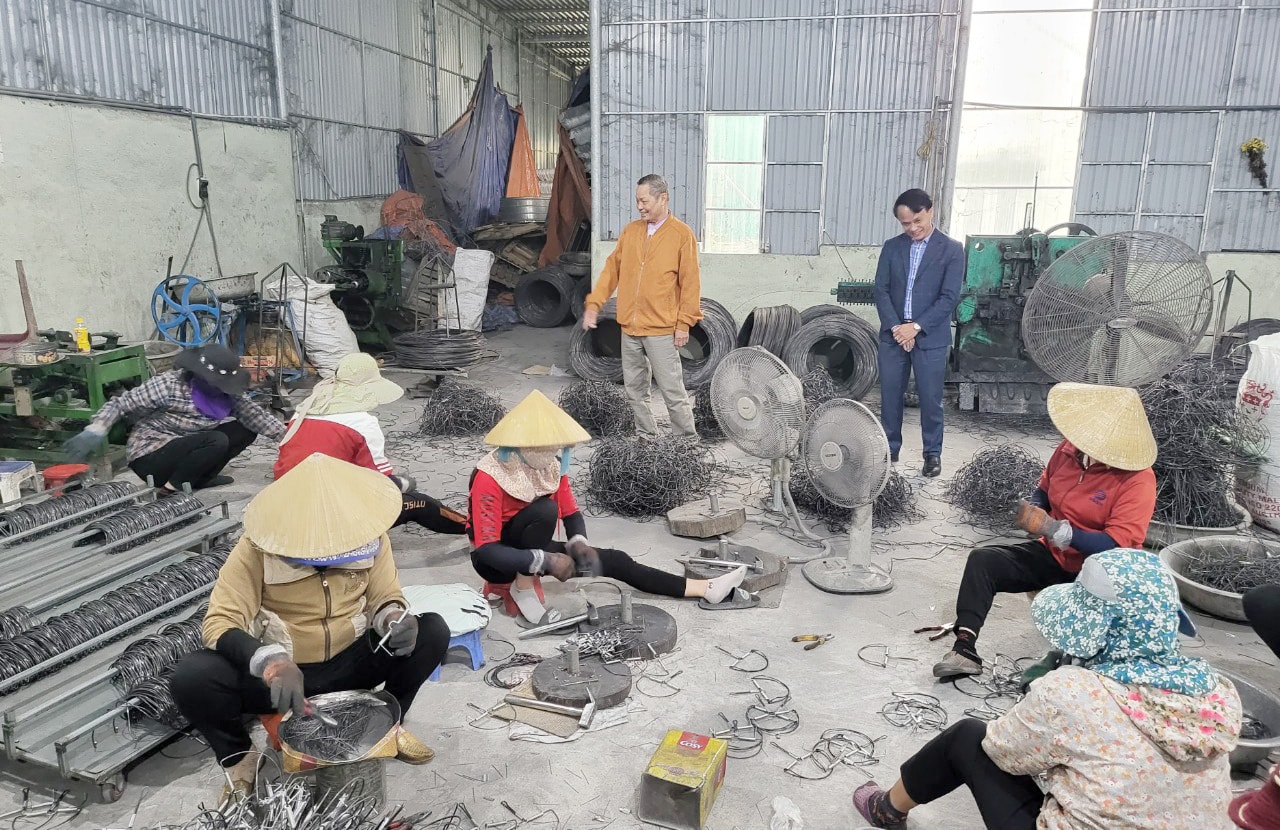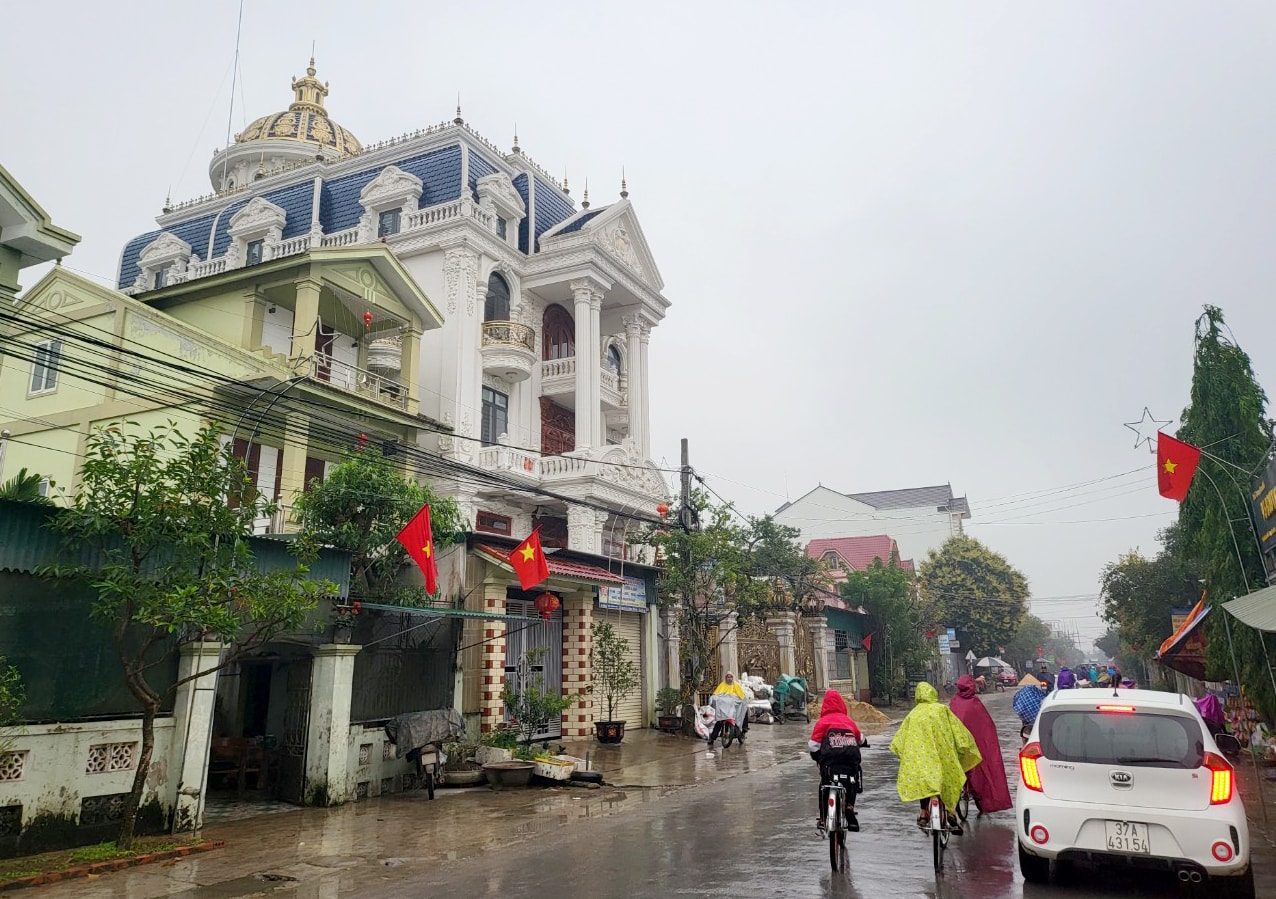Nghe An people in Laos 'weather the storm' of inflation
(Baonghean.vn) - Inflation and devaluation of the Lao Kip currency that has lasted for more than a year have affected thousands of Nghe An workers living and working here. In that context, workers have found ways to cope and adapt.
Return
Cam Thiet village, Dai Dong commune (Thanh Chuong district) was previously famous for having hundreds of workers working in Laos. Some have been there for nearly 30 years. Some have been there for a few years or so. Thanks tolaborAfter going abroad, the villagers' lives gradually stabilized, many households became well-off and rich...
Among those who have been attached to Laos, Nguyen Huu Tho is considered a veteran because including the years he served in the army and was stationed in Laos, he has now been attached for nearly 30 years.
 |
After more than 20 years working in Laos, Nguyen Huu Tho (Dai Dong commune, Thanh Chuong) has returned home to stabilize his life. Photo: My Ha |
Talking about memories of Laos, Mr. Tho remembers a lot, from his days in the army. Later, after leaving the army, he was one of the first workers to go to work in Laos. His journey to work abroad was also full of hardships. The most memorable is the early 2000s, when he and his fellow workers participated in opening a road from the Nghe An border to Laos. On many routes, they had to weave through the forest, passing through places where bandits were still harassing them. Later, he and his fellow workers mainly did construction work in Bolikhamxay province. The income was not high compared to many developed countries, but compared to farming at home, it was stable and much higher. Thanks to working in Laos, he and his wife were able to raise their children, build a decent house, etc.
Difficulties only began to occur from the beginning of 2022, when the kip currency began to lose value. Initially, 1,000 Lao kip, when exchanged for Vietnamese currency, could be worth 3,000 VND. Later, inflation increased, the difference decreased rapidly from 2,700 - 2,500 VND and by the end of 2022, 1,000 kip could only be exchanged for 1,400 VND.
Speaking more about this, Mr. Tho said: The Lao currency has depreciated, so after we get paid, we don't have much left in Vietnamese currency. Before, we earned about 20 million VND per month, and we could save and send half of it home. But when inflation increased, the money we earned was mainly enough for our expenses. Therefore, not only me but many other workers working in Laos also decided to return home. I think that with this income level, construction workers like me can easily find a job and have a similar income when we return home. Meanwhile, I am close to my wife and children, and don't have to live a "household meal, market porridge" life.
 |
Many workers working in Laos in Dai Dong commune have returned to their hometown. Photo: My Ha |
In the same village, two brothers Phan Van Phu and Phan Van Quy have just returned from before Tet and do not know when they will return. Sharing about this, Mr. Quy said: The Lao economy is suffering from inflation, which not only affects workers but also contractors. In fact, the price of raw materials has increased so much that most projects in Laos have had to be temporarily suspended and most construction workers are unemployed. If we stay, we will spend a lot of money. My current wish is to soon find a job in my hometown with a stable income so that my brothers can return home with peace of mind.
Thanh Chuong district has about 500 people working in Laos. After inflation, the number of people returning has increased but not really disrupted. Through discussion, Mr. Nguyen Van Hoe - Head of the Department of Labor - Invalids and Social Affairs of Thanh Chuong district said: Workers in our district who go to Laos to work mainly work in the construction sector. Therefore, when they return to their locality, they do not encounter too many difficulties in finding jobs because the construction industry is currently "thirsty" for workers, especially skilled workers.
Adaptation
At its peak, Dien Thap commune (Dien Chau district) had over 2,000 workers working in Laos. 30 years ago, few people knew that, starting out as scrap collectors, the people in the commune "adapted" to doing business in Laos and then became a millionaire village.
Talking about this, Mr. Dau Xuan Manh - Chairman of the Commune People's Committee added: In the past, Dien Thap commune was very poor, people mainly did farming. Later, due to difficulties in making a living, people in the commune bought motorbikes to buy scrap to "sell and resell" to make a living. Later, the profession developed, instead of trading scrap, people in the village switched to trading household goods and expanding the market to Laos. At first, the capital was small, people did small business mainly selling blankets, mattresses and aluminum pots. After many years of working, with money, they expanded production and business and many people became millionaires, big bosses.
 |
The rat trap factory for export to Laos owned by the people of Dien Thap commune (Dien Chau) provides jobs for many local workers. Photo: My Ha |
One of the people considered to be veterans in the village who worked in Laos is Mr. Nguyen Duc Lung (Hamlet 5, Dien Thap Commune). His life has had many ups and downs because he was a soldier in Laos. After the liberation of the South, he was demobilized and returned to work as a commune cadre. Retiring in the 90s, he was one of the pioneers in the commune to go to Laos to do business. According to Mr. Luan, doing business in Laos is quite simple because it is mainly small business. After many years of selling goods on the street, he had capital and opened a store in Se Kong province, mainly selling household goods. According to Mr. Lung, doing business in Laos quickly became rich thanks to "the difference between Lao and Vietnamese currency".
The most glorious time was in the 2000s, Dien Thap people bought cheap goods in Vietnam, then sold them for Lao currency and then exchanged them for Vietnamese currency, which could be considered "a four-fold profit". Because of the good business, later all three of Mr. Lung's children went to Laos to do business and were one of the successful families with "food and savings". However, in the past two years, seeing that the Lao economy had many fluctuations and the currency was losing value, his children began to change direction, only "staying" one person in Laos. The rest moved to the border area to run a hotel business.
Mr. Nguyen Duc Lung also added: Business can be good at times and bad at times. However, instead of being passive, we proactively change careers to still have a stable income.
 |
A corner of Dien Thap commune (Dien Chau). Photo: My Ha |
Like many other localities, people in Dien Thap are greatly affected by the economic recession in Laos, most notably in the transportation and construction industries. The family of Ms. Le Thi Hoa (a judicial officer in the commune) has a husband, father and younger brother who are all working in Laos in the transportation business. Previously, this job was quite good, so from a cargo truck, the family pooled capital to buy another truck to transport goods from Nghe An to Laos. But over the past year, the economy has been difficult, and the income from the shipments is only enough to cover travel expenses. To make up for the shortfall, the family had to expand the area, transport more types of goods and take on additional garage jobs...
Career transitions have also been evident in Dien Thap commune in recent years. The most obvious is the decreasing number of workers going to work in Laos.
Instead, people either open a factory at home like the couple Ngo Thi Hoa and Chu Van Thien - who switched to producing mousetraps to sell to Laos; some people with a lot of capital and stable business continue to travel between the two countries to maintain customers. The rest, mostly young people, children in the village who have just grown up, choose to go to work abroad in high-income countries. Currently, statistics in the commune show that there are about 700 workers working in European countries, the US, and Canada. Instead of just developing the economy, people in the village spend their savings to invest in their children's university education or study abroad.
This change and adaptation is also a positive and welcome thing!

